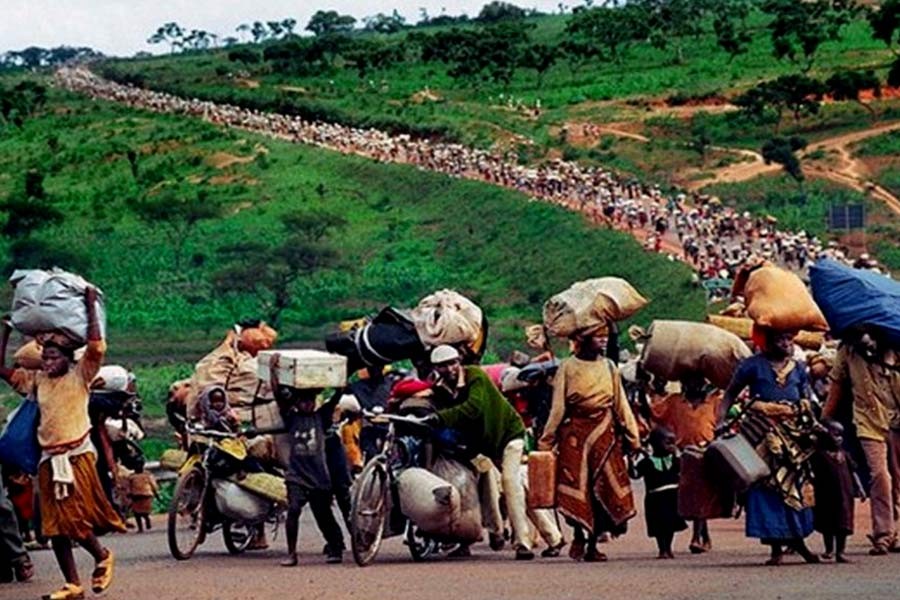The Myanmar military issued a rare apology on Monday, acknowledging that two photographs it published in a book on the crisis over the Rohingya Muslim minority were “published incorrectly”.
The military’s official newspaper, the Myawady Daily, issued a statement on Monday from its publishing arm, which produced the book ‘Myanmar Politics and Tatmadaw: Part I’, apologising for two of the photographs, reports Reuters.
“It was found that two photos were incorrectly published,” the publishing arm said in a statement carried by the newspaper, referring to the photograph from Tanzania and another showing victims of Bangladesh’s 1971 war of independence.
“We sincerely apologise to the readers and the owners of the photographs for the mistake,” it said.
It did not mention the photograph incorrectly captioned as showing Rohingya entering Myanmar when the picture was of them leaving.
Myanmar government spokesman Zaw Htay and military spokesman Major General Tun Tun Nyi could not be reached for comment.
The army’s department of public relations and psychological warfare published the book in English and Burmese in July.

Reuters published an exclusive report on Friday revealing that two of the pictures in the book that aimed at illustrating the army’s account of last year’s events in the western Myanmar state of Rakhine, were in fact archive pictures of different conflicts, and one was posted with an incorrect caption.
The erroneous publication of the photographs comes amid a series of government steps against what it has seen as media abuses, including a report on army activity in an ethnic minority guerrilla zone and the flying of a drone in the capital, Naypyitaw.
On Monday, a court jailed for seven years two reporters from Reuters on a charge of violating a secrets law.
‘HEINOUS’
Of the 80 images in the book, most were recent pictures of army chief Min Aung Hlaing meeting foreign dignitaries or other officials visiting Rakhine.
Of eight photos presented as historical images, Reuters found the provenance of three to be faked and was unable to determine the provenance of the five others.
One faded black-and-white image shows a crowd of men who appear to be on a long march with their backs bent over. “Bengalis intruded into the country after the British Colonialism occupied the lower part of Myanmar,” the caption reads.
The photo is apparently intended to depict Rohingya arriving in Myanmar during the colonial era, which ended in 1948. Reuters determined the picture is in fact a distorted version of a colour image taken in 1996 of refugees who had fled the genocide in Rwanda.
Another picture, also printed in black-and-white, shows men aboard a rickety boat. “Bengalis entered Myanmar via the watercourse,” the caption reads.
Actually, the original photo depicts Rohingya and Bangladeshi migrants leaving Myanmar in 2015, when tens of thousands fled for Thailand and Malaysia. The original has been rotated and blurred so the photo looks granular. It was sourced from Myanmar’s own Ministry of Information.
The Myawady’s publishing arm, in its statement, made no mention of an alterations of images.
Bangladesh Prime Minister Sheikh Hasina also denounced the use of the photographs when she was asked in a news conference about them.
About 700,000 Rohingya Muslims have taken shelter in Bangladesh after fleeing from a Myanmar military crackdown launched after Rohingya insurgent attacks in August last year.
“What Myanmar has done is simply heinous. They have lowered their reputation,” Sheikh Hasina told a news conference in Dhaka on Sunday.
“They are diminishing their position in the international arena,” she added.
The 117-page book gives the army’s account of the crackdown last year which led to reports of mass killings, rape, and arson.
Much of the content is sourced to the military’s “True News” information unit, which since the start of the crisis has distributed news giving the army’s position, mostly via Facebook.
The book is on sale at bookstores across the commercial capital of Yangon.


